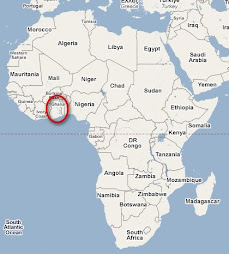I just finished my first full week of work and I am back in Tamale to stock up on some supplies, use the internet, and catch up with some other volunteers.
I have learned so much this week about the company I’m working with. Just to give you an overview…
ITFC has a nucleus farm with over 150 hectares and supports 1400 subsistence farmers. They manage a nursery where the mango seedlings are grafted with the desired variety before they are sent out to the farmers. The farmers are given the seedlings and technical guidance on an interest free loan which they do not have to start paying back for 5 years. Each farmer has is given seedlings for 1 acre of land, or 100 trees, where the down-payment is a bag of maize. The farmers are assigned to a field assistant who is supposed to teach them how to properly care for the trees and meet all the organic certification regulations. Each field assistant is responsible for about 40 farmers. Then there are 4 zonal mangers who monitor and evaluate the field assistants. The farmers are guaranteed money for their yields. ITFC exports the grade A mangoes to Europe and then sells the rest to local wholesalers.
The company is in the process of implementing a drip irrigation system for all the farms. Currently they pump the water into tanks and truck it to the fields. Then it is up to the farmer to actually irrigate the fields. This system is inefficient and does not seem to be working. In order to have access to water that does not have to be pumped long distances (installing pipes is labor intensive and expensive) ITFC has been building small dams in various areas throughout the dry season. This year we will see how well they hold up when the rains really come.
ITFC is also trying to improve education in the areas they work. There are schools in the farming villages, but teaches do not want to move out of their home towns to live in mud huts so ITFC is building housing compounds for the teachers. In addition they feed all the school children one meal a day.
ITFC will soon receive equipment for a drying facility and in the future they would also like to process the mangoes into juice, mango butter from the seed, and even mango oil from the skin. This is in the long-run, there is much to do before then.
I believe in the vision of this company and believe that in the end their efforts will benefit Ghanaians. But ideas become so much more complicated when put into action. Just to give you some examples of problems (I hope to expand on these throughout the summer): The locals siphon the diesel out of the generators that are used to pump the water (even though there is a watchman for the equipment), the pump operators do not properly monitor the water level so the pumps burn out because they suck up the sand at the bottom, there are children who benefit from the school feeding program who do not go to school (not sure if this is good bad yet), the farmers don’t understand how to properly prune the trees, many farmers neglect their farms and the trees die, I could go on but I think you get the idea.
Now that I have a pretty good overview, I’m going to start spending more time with the farmers and observing how they are using their water, and gaining a better understanding of their livelihoods and culture so that I will hopefully be more enabled to come up with an irrigation training program. Wow that’s a run-on!
So I’m sure some of you are wondering what my living conditions are like. Right now I am living in a compound for ITFC employees. A compound is a series of rooms in the shape of a rectangle with a shared courtyard. There are some field assistants, two women, a cute little kid named Abraham, a welder, and a peace core volunteer (crazy huh?). There is no electricity but we do have running water from a tank. One of the women said she would teach me how to cook Ghanaian food. I’ve received some feedback on my hand-washing abilities… laundry is hard work! The rains are INSANE, it’s happened twice so far. There are goats, cows, sheep, guinea fowl, and chickens everywhere. I’ve seen a crocodile, a chameleon, and some monkeys. The food is OK, the mangoes are great. I hear lots of weird noises at night and wake up to the Muslim prayers around 5 AM.
So there is a bit of info on things not related to work, I will try to focus more on the culture and my experiences in my next post.
Hope you all are well... here are some photos


left: Some other Ghana volunteers, completely exhausted during our lay-over in Amsterdam
Right: Craziest cloud I've ever seen, we were inspecting one of the mango farms

They were in the process of pouring the concrete when the rains came. If you look closely you can see they are trying to use a rubber mat as a temporary wall so they can continue pouring. There are no building codes or standards in Ghana. Looking at construction sites there are so many things that seem wrong to me that I don't know where to start.


Left: Women working at the mango seedling nursery
Right: Local farmers receiving their mango seedlings







